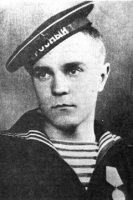Valentin Pikul wrote multi-volume epics and miniatures, combined fiction with documentary prose and most of all loved the motherland, history and the sea. He kept records of all his characters - more than a thousand cards were kept in the writer's card index.
The future writer was born in Leningrad in 1928. As a child, Valentin Pikul dreamed of becoming a sailor. When the family moved from Leningrad to Molotovsk (now Severodvinsk) under construction, the boy joined the "Young Sailor" club at the local Pioneer House. The Great Patriotic War caught Valentin with his mother Maria Pikul in Leningrad - they went there for vacation. After the first winter of the blockade in the spring of 1942 Pikul left for Arkhangelsk along the Road of Life. Father Savva Mikhailovich, who served in the White Sea Flotilla, in the summer of the same year volunteered for Stalingrad and died there. And 14-year-old Valentin Pikul ran away from home - he wanted to enroll in the school for young sailors that was created on Solovetsky islands.
People were taken there from the age of 15, after six or eighth grades, and the future writer managed to finish only five. But the commission made an exception and he was enrolled in the school after all. Everything was decided at an interview at the admissions committee, before which Valya laid out his "essays" on maritime affairs and almost patteringly shouted the names of all 32 points of the compass card," wrote the writer's widow Antonina Pikul. - On Solovki we had to start from scratch... the sailors were digging stumps, felling wood, turning over rocks, building dwellings, service rooms, equipping classrooms; in fact, they were creating a school with their own hands". This experience later formed the basis of the story "The Boys with Bows".
In 1943 Pikul graduated from the school, he was sent as a helmsman on the Northern Fleet destroyer "Grozny". The ship accompanied convoys that delivered food, weapons and equipment from the Allied countries to Murmansk and Arkhangelsk.
When people ask me personally whether I do not regret that I held the steering wheel of a battleship at the age of 15 instead of a school textbook, I answer quite sincerely: no, I do not regret it. And today, from the perspective of years gone by, I see even more clearly than before, that no textbook ever would have given me so much knowledge of life, people, as that severe experience that I received during the war.
Valentin Pikul, "History is fire, not cold ashes".
Once "Grozny" miraculously escaped its death - a torpedo passed under the bottom of the ship. Pikul stayed on the ship until the end of the war - he was promoted to commander of a combat post and then became a navigator.
Immediately after the war Valentin Pikul was sent to the Leningrad Naval Preparatory School, but a year later he was expelled for bad academic results.
During this period Pikul independently studied the history of literature and world history, attended the literature circles of Vera Ketlinskaya and Vsevolod Rozhdestvensky, wrote poems and short stories. In 1946 he conceived his first novel, A Course for the Sun. "Like most writers who came to literature from damp front trenches and from slippery ship decks, I knew I had to write, but I didn't always understand how to write," he admitted later in his autobiography, Night Flight. He began the novel three times - rewrote, edited, but still remained unsatisfied with it. Pikul recalled: "Thank God, this novel did not see the light. I wrote a second novel - it also went in the trash. Then I sat down and, being angry at the whole world, wrote a third novel. It was "The Ocean Patrol" about the war in the Kola Peninsula. The book was published in 1954 by "Molodaya Gvardiya" publishing house. After this novel Pikulia was admitted to the Union of Writers.
The writer's interest in the Russian North and the Great Patriotic War grew into an interest in the history of the Motherland In 1961 Valentin Pikul's first historical novel "Bayazet" was published.
This work is dedicated to the heroic defense of the Russian garrison of the Transcaucasian Bayazet fortress during the Russo-Turkish War of 1877-1878.
"For more than three weeks, almost a whole month, day after day, hour after hour - under bullets and swords, in sweat and blood, dying of thirst in the Araratian scorcher, held on to only one thing:
- To endure!
And we stood - as we suffered, for all twenty-three days".
Valentin Pikul, "Bayazet"
In 1962, Valentin Pikul moved to Riga, where he moved a colossal library - more than 10 thousand volumes. Before he started to write his novel, Pikul studied all the literature on the subject, looking for translations of foreign sources. He became acquainted with the memories of eyewitnesses who were on opposite sides of the barricades. For each of the characters Pikul made a card, where he wrote out interesting facts about the life of a hero. In such a card index Pikul kept more than a thousand cards. The writer also talked a lot with professional historians.
A writer of modern times does not think about setting his characters at the table, giving them tea, and serving them biscuits; he lives among his characters, and therefore their habits are his habits. It is quite different in a historical novel! To say that the characters sat down to tea is to say nothing about tea drinking. A lot of questions immediately arise: did they have a kettle? How did they make tea? What were they drinking from? With or without sugar? It is on such historical details and the novelist often stumbles.
Valentin Pikul, "Night Flight
Pikul was often disgraced for his independent views and distrust of Soviet official sources. The discussion of the historical novel Unclean Power resulted in a public scandal. It was partly published in 1979 in the journal Nash sovremennik. In the novel Pikul described Russian life on the eve of the revolution of 1917. He made Grigory Rasputin, the favorite of the last emperor Nicholas II, the main character of the work. The author was criticized for historical inaccuracies. "It remains unclear why the author needed to raise the long forgotten and buried in the landfill of history events and facts" - wrote historian Irina Pushkareva.
Pikul created almost two dozen major works and many articles. At the end of the 1980s, the writer began to turn to the genre of historical miniatures - what he called short stories-essays about historical figures.
 I have long loved Russian classical portraiture, but I have a special affection for miniature painting. For me, as an author, every miniature is a historical novel, only condensed to the smallest number of pages. Writing miniatures is a tedious process, time-consuming and labor-intensive. Thus, for example, I wrote a 15-page miniature about the artist Ivan Myasoedov for 15 long years, literally nugget after nugget collecting material about this strange man who was rarely mentioned in the press.
I have long loved Russian classical portraiture, but I have a special affection for miniature painting. For me, as an author, every miniature is a historical novel, only condensed to the smallest number of pages. Writing miniatures is a tedious process, time-consuming and labor-intensive. Thus, for example, I wrote a 15-page miniature about the artist Ivan Myasoedov for 15 long years, literally nugget after nugget collecting material about this strange man who was rarely mentioned in the press.
Valentin Pikul, from the introduction to "Through thorns to the stars".
Pikul wrote more than a hundred miniatures - they tell of Russian and foreign history, of objects of art and ships, generals and ordinary soldiers, people known and long forgotten.
Valentin Pikulia died on July 16, 1990. After his death, a book was found with the inscription: "When I die - this book will be given to someone, and he will think, why I was interested in such subjects? That's just it, the diversity of interests is what made me a writer. Though I never called myself that in my lifetime, preferring the more humble word "literary man. I had only a five-class education and I had been fighting from the age of 14, and everything I acquired afterwards I acquired from a passionate, almost fantastic, love of learning. Now I am 31 years old, I have two novels done, four more are planned. Pikul Valentin Savvich, Russian, born July 13, 1928, died July 13, 19...".



